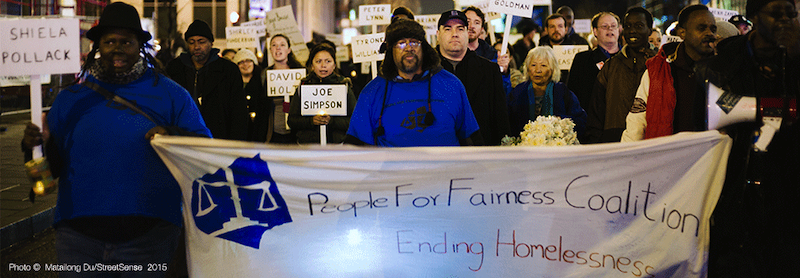As this definition alludes, human rights are relevant to the daily lives of all DC residents. As Eleanor Roosevelt once said, “Where, after all, do universal human rights begin? In small places, close to home”. However, for many in the nation’s capital, the 25th Article of the Universal Declaration of Human Rights is not only relevant. It’s paramount.
Article 25 of the UDHR reads: “Everyone has the right to a standard of living adequate for the health and well-being of himself and of his family, including food, clothing, housing, and medical care and necessary social services, and the right to security in the event of unemployment, sickness, disability, widowhood, old age or other lack of livelihood in circumstances beyond his control.”
DC’s 2020 point-in-time count found 6,380 individuals experiencing homelessness on Jan. 22, 2020. The economic fallout from COVID-19 could likely cause this number to have risen/rise.
Robert Warren and the People for Fairness Coalition are working to make sure the human right to housing is upheld for all DC residents. Robert serves as the Director of the People for Fairness Coalition (PFFC). PFFC’s mission is to empower people to end housing instability in the Washington DC Metropolitan area through advocacy, outreach, and peer mentoring.
PFFC makes their position on housing clear in everything they do. In testimony given to the DC Council, written in Sharpie on poster boards at rallies, PFFC reiterates what the UDHR states: Housing is a human right.
For Robert, DC’s status as a human rights city has the power to realize this right. However, while Robert is proud that DC is a human rights city, he believes there is a lot of work to be done to live up to that commitment. DC’s status as a human rights city “should mean something to [elected officials]. It should be reflected in their public policies.”

For PFFC, this means the development of strategies and policies that would increase access to affordable and sustainable housing for DC residents. Since 2013, PFFC has been working towards this goal through its Universal Right to Housing Campaign. When asked what policies changes would reflect DC’s commitment to the 25th article of the UDHR, Robert is not at a loss for answers: housing costs should not exceed one-third of income, elimination of the waiting list for housing assistance, availability of housing vouchers for those who qualify, diversion of tax dollars from luxury apartments to affordable housing units, safe and clean housing affordable housing, the creation of social housing.
Robert is an effective and empathetic leader of PFFC and this campaign due to his own life experiences with housing instability. Robert, as well as his family members, have experienced homelessness at different points throughout his life. Because of this, Robert understands the resounding impact of this basic need. Robert emphasizes that homelessness creates long-term problems mentally, physically, and spiritually. It traumatizes those who experience it. Stable housing goes a long way in addressing these issues. It also creates more stable communities.
With Robert at its helm, PFFC has had a tangible impact on securing the right to housing for DC residents. Robert’s proudest accomplishments from his career are triumphs he has helped achieve for others. PFFC helped address sleep deprivation in shelters by advocating for 4 additional hours of access. They advocated for the creation of the Adams Place Day Center and PFFC members served as mentors after it opened. Robert is also especially proud of the work he and PFFC have done for homeless veterans.
Despite these successes, the work to secure the human right to housing for all Washingtonians continues. Any article celebrating the work of Robert Warren and the People for Fairness Coalition would be remiss not to mention their ongoing dedication to their mission.
Currently, Robert and PFFC are working towards securing homeless individuals as a protected class under the DC Human Rights Act. The Michael A. Stoops Anti-Discrimination Amendment Act of 2019 would do exactly that. This bill is currently being considered by the DC Council.
While Robert admits the past few months have been challenging, he remains hopeful. In his words, “The revolution goes on.”








